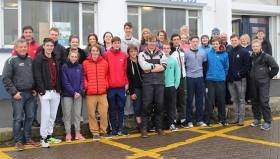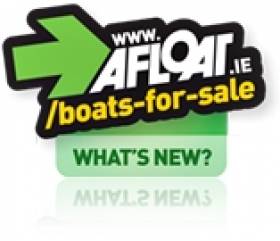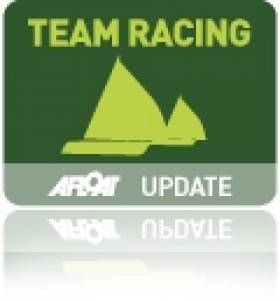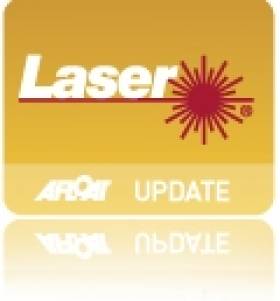Displaying items by tag: Pico
Cadets and Young Ordinary members of Howth Yacht Club who are looking for a way to flex their competitive muscles can take to the water for weekly Pico team racing from 6pm this Friday 6 May.
Non-members are also welcome to round out the teams, which will be given a club Pico to race in as well as a reserved spot in The Light House pergola for race afters. For details see the Quest Howth website HERE.
But it’s not only Friday night lights at HYC, as Thursdays will also come alive this month with sessions for sharpening sailing skills delivered by a fully qualified Irish Sailing keelboat instructors in the club’s J80s.
The course runs for three weeks from next Thursday 12 May, from 6.30pm to 9pm and Quest has details HERE.
HYC notes that the last such course was equal parts sailing and socialising, perfect for easing into the summer season.
The Irish National Sailing & Powerboat School has been active this winter in anticipation of a busy summer season writes Principal Kenneth Rumball. Through various acquisitions the following additions to the INSS fleet have been made, 13 sit–on Kayaks, five double Kayaks, three rescue boats, 14 Laser Pico Training dinghies, 12 Topper dinghies, two topaz dinghies, three Topper Vibe dinghies, 10 Optimist dinghies and the purchase of another 6.5m fast RIB for our busy powerboat courses.
We have recognised a growing demand at the Irish National Sailing & Powerboat School and we are being proactive in our purchase of equipment ahead of what we hope will be a busier than ever season! Our latest additions show our commitment to continue to be the leading Sailing & Powerboat Training centre in Ireland catering for everybody from the novice power-boater or sailor in dinghies and yachts to a seasoned racer looking to upskill or the experienced power-boater looking to take his skill to the next level. With the current fleet size of sailing and powerboats in the INS&PS standing at over 200 boats, we certainly have the capacity to get everybody on the water.
Our new fleet of course requires more instructors and for this we have been busy training staff not only to fulfil the demands of the Irish National Sailing & Powerboat School but also of the country of Ireland. The Easter break was particularly busy with an ISA Dinghy Instructor Course run before the Easter weekend with 8 attendees and then after the Easter weekend we ran an RYA Dinghy Instructor Course with 18 attendees. We also ran possibly the first RYA Cruising Instructor Course to be held in Ireland over the break, training instructors to the level required to teach up to Day Skipper Practical level on the new ISA and RYA Cruising schemes. Not forgetting the other ISA Dinghy Instructor Courses, RYA Powerboat Instructor Courses that have already been run this year.
Here is a quote from one of our newest dinghy instructors;
“I'm just after completing my dinghy instructor course in the INSS and am so excited now to be able to pass on my skills to younger sailors and adults alike! The course was tiring at times but we all learnt so much and really enjoyed ourselves. It really was a fantastic week and year of training.” - Clodagh Quinn
Now that we have the extra boats and staff in place, we are gearing up for what we hope will be a busy and enjoyable summer.
Learn to Sail in a Laser Pico Dinghy For Sale at €1300
#BOATS FOR SALE –The seller of this Laser Pico sailing dinghy could not have picked a better time to put the 12 foot boat up for sale because April is the time of year when Mums and Dads are looking for boats for junior sailing courses. The Laser Pico is a fun, durable, confidence-inspiring, boat that can be sailed by everyone. It's ideal for entry-level sailors and this one has not been used for the past two years.
The rotomoulded Pico is popular at so many sailing schools around the country we don't see this boat for sale for long.
It comes with a launching trailer and the advertiser says it is in great condition, complete with rudder and dagger board. There is a brand new jib. Ideal for beginners or children, easy to manage.
The full Pico advert is here.
See all our dinghies for sale on the Afloat Boats for Sales site here.
'2k' Format Will be New Lease of Life for Team Racing
Irish team racers, and those whose college sailing days are behind them, can look forward to rediscovering the joys of a new kind of team racing writes our Correspondent, Magheramore.
The Dutch have discovered team racing. They have become very keen on two boat team racing in keel-boats with 30 teams competing in their National Championships. Realising the potential for this version of the sport a major international event is planned in September this year, and there is a bid to run an official World Championships in 2013.
An international circuit is now emerging for this discipline – now known as 2k. Events are planned on the Clyde, in Italy, Poland, England and the Netherlands. The potential is considerable. In many countries sailing centres have fleets of small one design keel-boats already used for match racing. 2K racing increases the number of days these fleets are in competitive use. There is also a well established circuit in the USA, where the Sonar is commonly used. There are even events organised especially for the more mature sailor.
This should be good news for Irish sailors. We have a long tradition of team racing, with predominately university teams competing in Firefly dinghies. In Munster, the group based around Schull Community College has provided a base for schools team racing, and the whole town did a magnificent job of hosting the Worlds last year. In addition, the Royal Alfred Yacht Club has maintained a tradition of team racing in keelboats with the Patriots Cup, not to forget the Glen class in Dun Laoghaire who compete in the Millennium Cup, a 4 boat per team event. Many graduate sailors have moved on to match racing, using the Sailfleet J80s, with some success.
The development of 2k racing is an opportunity for clubs. Team-racing, in all its forms, creates a dynamic within the club, as teams train and compete and socialise. Graduates, who seem to find the Firefly gets smaller every year, can relive the exploits of their college days without breaking the bank. As events can be graded, adult trainees can experience the joys of competitive sailing at level suited to their ability. Sailing club boats will increasing look an attractive proposition to the negative-equity generation
The initial outlay to procure a fleet of boats may seem a considerable obstacle. However, if the right boat is chosen they can have a long and useful life. There is, for instance, in Brittany, a fleet of Beneteau Class 8s that have been raced hard for 20 years and are still in use for top class competition. The Dun Laoghaire 1720s also demonstrate that there is no need to buy new boats.
The cost of a day's sailing, including maintenance and depreciation, reduces rapidly the more boats are used. If a fleet can be used for match racing, 2k racing and adult training then the number of days sailed should sufficient to cover these costs.
With moves afoot to further develop junior and schools team racing this most social version of the sport is a true "Sport for Life" with the added advantage for sailors (and their parents!) of being able to compete at the highest level without the strain of owning a boat. It is now possible to envisage a career in sailing progressing from beginners sailing courses through junior team racing in Picos, then Fireflies or similar, with the prospect of travel to the UK, the USA or the Eurosaf Championships on the lagoon in Venice. After college racing and a foray in to the UK circuit (and further afield) a move to keel-boats would allow sailors to continue to race almost indefinitely.
All in all, the Dutch initiative to develop team racing in keelboats is to be welcomed. Irish team racers, and especially those whose college days are behind them, can look forward to rediscovering the joys of the squeeze, the mark trap and the sweet sound of the umpire's whistle! Anyone for a trip to the Low Country...?
Do Some Funny Sailing for Comic Relief
In Weymouth, SailLaser's RYA Onboard Club are invited to teach a friend to sail in a Laser Pico before heading off to the race course in pairs. The race around a short course will have the added challenge of collecting as many letters from each turning mark as possible. The winners will be those who can spell the longest word from the letters they collect at the end of the race!
SailLaser's "Race Club" members will also be able to introduce a friend to sailing and after a short introduction they will battle it out on the race course in the fleet of Laser Bahias.
In Scotland, RYA OnBoard Club fund raisers will take part in a multi-disciplined "Tri-Mile" event. The Tri-Mile will include a run, pedal and sail; running from the start line to a pedalo on the shore, pedalling to a Pico moored in the middle of Strathclyde Loch and racing the Pico around a course before arriving back at the shore and running to the finish line!
To add to the fun, competitors, organizers and helpers are encouraged to wear fancy dress. The theme is RED!
"This is a great opportunity for all of our regular sailors to get on the water with a friend as well as raising money for Comic Relief" explains Hannah Burywood, event organiser at SailLaser Weymouth.
The charity Comic Relief was launched on Christmas Day in 1985 from a refugee camp in Sudan. The highlight of Comic Relief's appeal is the bi-annual Red Nose Day. The first Red Nose Day was held in 1988 and £15 million was raised. In 2009, over 5 times that amount was raised to support projects in 25 African countries and the UK. SailLaser is proud to do their bit to support Comic Relief in 2011.

































































